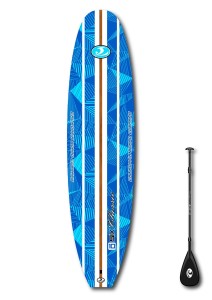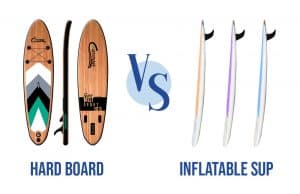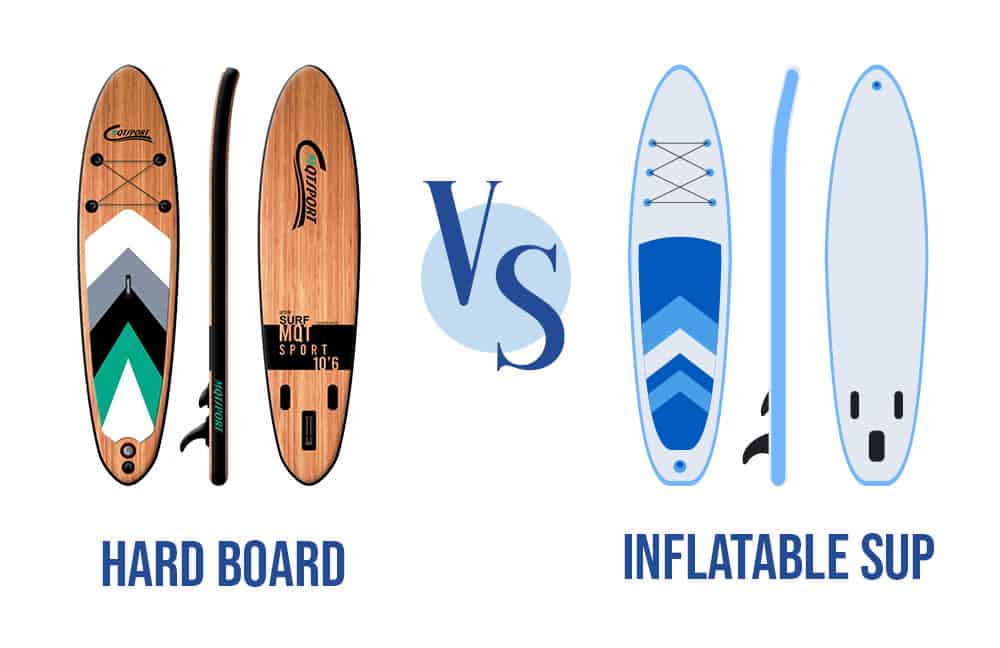Table of Contents
Inflatable Stand-Up Paddle Boards or SUP Hard Boards? Which Is Better?
Stand-up paddle boarding has boomed over the last few years. It’s not just water babies we’re seeing out there either. We see keen athletes and everyday people enjoying some time on the water.
If you’re interested in buying your own stand-up paddle board. You may have noticed there are inflatable boards and hard boards.
But, which one is best for you? What are their advantages? These are the questions we’ll be answering throughout this article.
What Are The Advantages of an Inflatable SUP Board?

[icon icon=”arrow-right” color=”#81d742″] Portability
One of the biggest explanations as to why inflatable stand-up paddle boards are so popular is their portability. Unlike hard boards, inflatable stand-up paddle boards can be folded away and stored in a backpack.
You don’t need to worry about finding space for them or securing them to your vehicle. You simply pack it into your vehicle as you would do with a suitcase or bag.
What’s better is they can easily be taken on public transport. If you’re traveling around on planes and trains you can easily take your inflatable stand-up paddle board with you too!
[icon icon=”arrow-right” color=”#81d742″] Durability
It’s a common misconception that inflatable SUPs are easy to damage or puncture. Over the years, inflatable stand-up paddle boards have evolved into high-quality, damage-resistant boards.
Many inflatable boards are made with military-grade PVC to protect your board from any knicks and dings in and out of the water.
There’s no need to worry about little rocks and debris in the water, as most inflatable SUP will not be affected by them. On the other hand, hard boards are easier to damage. Granted, they’re not going to burst like an inflatable SUP would if severely damaged. But, small rocks and debris can leave chips and scratches on your hard board.
This isn’t a huge concern in the short-term, but it all adds up in the long-term. If there’s a significant drop of your hard board, there is a chance it will shatter too.
[icon icon=”arrow-right” color=”#81d742″] Stability
Inflatable boards typically have greater stability than hard boards. Inflatable boards have a greater weight capacity than hard boards, thus offering riders more stability.
If you’re a beginner or want to perform SUP yoga, greater stability is a huge advantage. What’s great, is you don’t have to compromise on board dimensions to gain this stability either.
If you compare an inflatable board with a hard board, both with the same dimensions, the inflatable board will still offer more stability.
[icon icon=”arrow-right” color=”#81d742″] Versatility
Inflatable stand-up paddle boards are perfect if you want to do a bit of everything. They don’t exactly excel in one area, but they can be used for almost any paddle boarding activity.
In contrast, hard boards tend to be specific to a certain activity. For example, you can get boards made for racing, touring, or surfing.
While they’re great for their respective activity, they can’t be used for much outside that. If you’re a recreational paddle boarder looking to do a range of paddling, an inflatable SUP board is all you’ll need.
What Are The Advantages of a Hard Stand-up Paddle Board?

[icon icon=”arrow-right” color=”#81d742″] Specificity
Inflatable stand-up paddle boards are perfect for generic paddling But if you want to specialize in a specific area of paddle boarding, hard stand-up boards are a better option.
Hard stand-up paddle boards travel better over the water. They’re faster and maintain momentum much better than inflatable boards. If you’re racing, touring, or surfing these are very important qualities.
But, with this increase in speed and momentum comes a loss in stability. Hard boards typically come in a range of shapes and sizes to suit their respective area too.
For example, hard boards designed for speed will be thinner and narrower to optimize for performance. Beginners should steer clear of hard boards until they build-up the basic skills of paddle boarding on an inflatable board. Once you reach an intermediate-advanced level, hard boards become more appropriate.
[icon icon=”arrow-right” color=”#81d742″] Accessibility
Inflatable SUP boards might have the ability to fold away, but that also means you’ll have to pump it back up before you can use it again.
This can be quite a time-consuming (and exhausting) process. With hard boards, you can go straight into the water without fussing around with board preparations.
Of course, this means you will be traveling with a big chunky board. But, if you’ve got appropriate transport vehicles. This shouldn’t be a huge issue.
[icon icon=”arrow-right” color=”#81d742″] Speed and Maneuverability
We’ve mentioned hard boards are typically faster than inflatable SUP boards. Their difference in shape and weight make them much more nimble and rigid on the water. While inflatable SUP boards can be used for surfing, it’s near impossible to catch a big wave on them.
Hard boards designed for paddle board surfing are much easier to move around. Thus are more suited for catching big waves.
Another key consideration is the impact of the wind. You don’t have to be an expert to know inflatables and wind do not go well together. Windy conditions can make paddling on an inflatable SUP board an absolute mission.
It’s both frustrating and unenjoyable. Paddle boarding on a hard board in the wind isn’t exactly optimal conditions, but it’s much better compared to an inflatable board.
Some Key Takeaways with Inflatable SUPs Vs Hard Boards
Inflatable SUP Boards
| Pros | Cons |
| Easy to transport | Needs to be pumped up with each use |
| Greater stability | Lacks speed |
| More durable | Doesn’t suit specialized paddle boarding activities |
| Perfect for recreational and beginner riders | Doesn’t suit windy conditions |
Hard Boards
| Pros | Cons |
| Can be used straight away | Big and bulky, can be difficult to transport |
| Reaches high speed | Unstable |
| Easy to maneuver | Easily damaged |

Inflatable stand-up paddle boards and hard boards are great choices for stand-up paddle boarding. Which one is best for you will depend on what you’re using your board for.
Inflatable SUP boards are best suited to those who want an all-around board that’s easy to use and transport.
If you’re looking to specialize in a specific area of stand-up paddle boarding such as racing or surfing, hard boards will be a better option.
